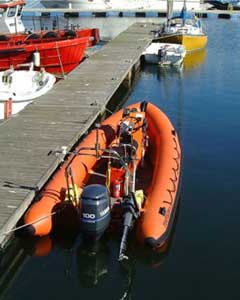Own Boat Tuition

International Certificate of Competence
The I.C.C. is available only to British Citizens or bona fide British Residents. (Evidence of British Residency may be required)
RYA Certificates of Competence may be produced in support of an application. Where no certificates of competence are held the application must be approved by a recognised Training Centre approved to carry out these tests.
If a certificate for inland waterways is required an additional test will be undertaken.
Syllabus
A - All Candidates
1. Knows the responsibility for keeping a proper lookout.2. Can determine a safe speed.
3. Can recognise a potential collision situation.
4. Can identify the give way vessel in a collision situation.
5. Knows what action to take as a give way or a stand on vessel
6. Knows responsibilities of a small vessel in a narrow channel.
7. Can recognise manoeuvring signals (1,2,3, and 5 short blasts)
8. Can make and recognise visual distress signals.
Safety
1. Is able to use and instruct crew on the use of lifejackets, distress flares, fire extinguishers and kill cord, if fitted.
2. Can prepare a boat for use and take sensible precautions before setting out, including engine checks, fuel for the duration of the trip, weather forecasts and avoid overloading the boat.
Section B - Inland Only
Understands the CEVNI (European Inland Waterways Regulations).
Section C - For Coastal Waters
1. Knows the rules relating to Traffic Separation Schemed.2. Knows what lights must be displayed at night.
3. Can recognise the following from their lights: power driven, sailing vessel, vessel at anchor, tug and tow, fishing vessel, dredger and can identify these vessels from their fog signal.
Pilotage
1. Knows the IALA buoyage system by day and night.2. Knows sources of information on local regulations, port entry and departure signals, VTS and Port Operations Radio.
3. Can plan a harbour entry/departure, taking account of presence of large vessels and avoiding navigational hazards.
Navigation
1. Can interpret a chart, understand depths and drying heights and can identify charted hazards.2. Can plot position by lat/long and cross bearings.
3. Can determine course to steer making allowance for leeway and tide.
4. Can use a tide table to find times of high and low water at a standard port.
5. Can determine direction and rate of a tidal stream from a tidal stream atlas or diamonds on a chart.
6. Understands basic use of a GPS.
Practical Boat Handling Test, Sail or Power
1. Start the engine.2. Depart from pontoon.
3. Turn 360 degrees in a cinfined space.
4. Pick up a mooring and secure to a buoy.
5. Recover a man overboard.
6. High speed manoeuvres (power) or Handling under sail, including sailing a triangular course, correct sail trim on all points of sailing, tacking and gybing.
7. Coming alongside a pontoon in a variety of Situations.
Fees
Own boat Tuition (Non-Certificate) - Instructor Only - £150 per day. Dates by arrangement.
| Course | Standard | 1:1 Tuition |
| PB Level 2 or I.C.C. (2 days) per person, based on 3 sharing | £150 | £400 |
| 1 day, 1:1 Level 2 or I.C.C. Assessment | n/a | £200 |